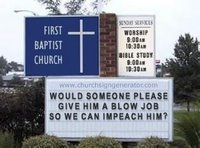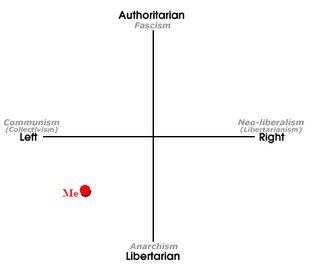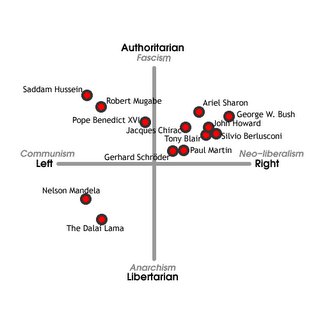I have been going to a lot of evangelical, Christian stuff lately. Well, two actually. One was a town hall meeting by a local public radio host,
Kojo Nnambdi...and another was a book reading by
Jim Wallis, a political Christian author and activist. In both cases, the discussion centered around the hidden masses of Christian lefties in the world (to an overwhelmingly secular audience). The speakers wanted to stress (among other things) that Christians occupy every node on the political spectrum, and that the conservative right do not have the monopoly on Jesus. I was surprised by how much I liked the Evangelist speakers as opposed to the secularists, who seemed irritatingly academic. The Evangelists, on the other hand, were passionate and articulate about social justice and activism, and most endearingly, placed gay marriage and abortion rights squarely at the bottom of a long list of problems that needs immediate attention. They reminded us that churches have often been at the forefront of fighting poverty, not to mention their galvanzing effect during the civil rights movement. My personal thoughts on Christianity swing wildly between acceptance, and even pride to deep-seated irritation and apathy and everything in between. However, one thing that I am certain of is the unhealthy and distasteful co-mingling of politics and religion in this country. Or more precisely, uniting Christianity with a few, politically motivated issues that have been allowed to take over the national discourse. I resent the fact that gay marriage and a women's right to choose has grown to the gross proportions that it has. But even beyond the pettiness of these discussions when there is a war going on, when there is poverty, disease and deep inequities in the world...even beyond that, I resent that these few, cherry-picked topics have become the basis for "Christian" values. I resent that a handful of people have been allowed to hijack our most basic human values like family, marriage, love and life--hijack these ideas, label them and market them out to us. Telling us that these are "Christian conservative values" and giving them very specific meanings and political weight that we never agreed to.
A few months ago, Ira Glass did an interesting, this-American-Life-esque show on Christianity. He interviewed a Christian leader whose name I can't remember (he was not one of the famous yokels on television though), who discusses the persecution that many Christians feel they suffer. I have heard this before, and it boggles my mind. As Ira quite correctly points out: Christians have X'mas and Sundays off as a major, national holiday. Every president we have ever had has been openly and freely Christian. Christians rank gazillionth in the hate crime hit list. All other religions have all been merely names we evoke in the name of political correctness, without any serious steps towards equal representation. At the very least, not nearly to the extent that Christianity has been made the very fabric of our society and our cultural base. There is nothing wrong with this, actually. Aside from the ridiculous controversy surrounding creationism and prayer in schools, there is nothing wrong with accepting the influence that Christianity has had on our world--it's in fact, unavoidable. (there's a fascinating discussion on secularism in
Amartya Sen's Argumentative Indian that's worth taking a peek at). What I do have a problem with is this notion of oppression that many (not all) Christians share. In trying to understand this, it occurs to me that I do have an instinctive distrust of Christian movements in the US (and I am not alone in this). And it's precisely because Christianity has too often been evoked in the name of taking away rights (be it gay marriage, or abortion), a strong rhetoric of exclusion (they vs. us), and most recently, anti-science politics. But the fact is, this is a false association. Jim Wallis made an interesting point during his talk. Christianity has never been an apolitical religion. He said, "Christianity is personal, but never private." I am certainly not advocating for non-participation in political and social dialogue, and "keeping religion out of it". What I am saying is, let's not reduce Christianity to a political tool used to rally support for a couple of right wing issues. We have allowed them to define Christianity for us, instead of figuring it out for ourselves.
In the name of celebrating diversity of political thought among Christians, and because it's funny and made me laugh…here's a Sunday proclamation...



 Bald Marys
Bald Marys



